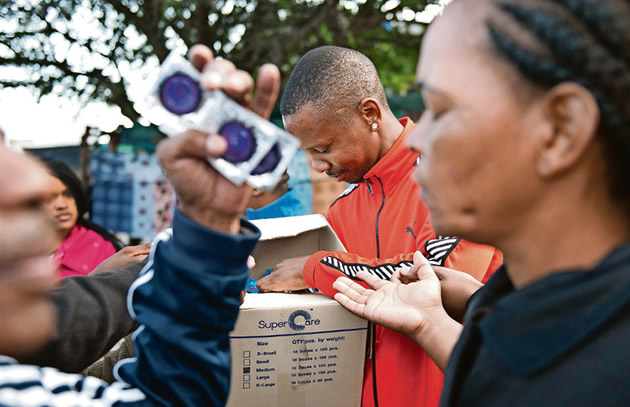Pasingataurike — The pain afflicting a private part


Help yourself . . . Due to education and openness on sexually transmitted diseases people quietly smile and openly pick the plastic packets (condoms)with the colour of their choice at public places
Dr Sekai Nzenza on Wednesday
“Tora hako. Usanyare.” “Help yourself. Do not be shy.” This is the sign at our village clinic, placed next to the box of condoms on the veranda where everyone can see. I saw the sign on Saturday when I took Mbuya Gambiza, my mother’s best friend and the midwife who delivered my mother on the day I was born, to the clinic for a blood pressure and general check-up. The sign was put up by Sister Mpho from Inziza, somewhere near Bulawayo.
Since her arrival at the clinic six months ago, Sister Mpho has taken the stigma out of diseases that affect private parts of the body, for both men and women. She is open, kind, humorous and generous. If it was not for her, Baba Ziro would not have returned to the clinic for dressings after the accident he had with his badly behaved steer called Jericho.
“Sister Mpho is Ndebele,” said Mbuya Gambiza, smiling and showing her age old teeth that have survived due to the brush of the muchakata tree over the years.
“This sister tells it as it is because she says Shona people around here are too shy to speak about illnesses that affect their private parts. If it was not for her, Baba vaZiro would have rotted to death!”
Baba Ziro got injured when the steer that was on a yoke decided to go after him, goring him on the part we cannot mention, pasingataurike. He lost a lot of blood on the way to the clinic. Sister Mpho quickly stopped the bleeding. Then she called an ambulance and Baba vaZiro was transferred to Murambinda Hospital where he was sutured nicely and all the bleeding stopped. He stayed in hospital for a few days.
He was discharged home in a kombi. When he got back to the village, he hardly left his house. He stayed inside listening to the radio that was powered by solar. People did not see him walk around the house or even take a short walk to the garden nearby. He refused to see visitors nor did he accept the use of a scotch-cart to go for dressings at the clinic. People whispered that he was too embarrassed to let female nurses look at his wound again.
“Where did he get hurt?” people asked Mai Ziro and she replied: “Hapataurike,” shaking her head, meaning, and the spot on the body where the injury occurred was too embarrassing to mention. We were all left guessing and imagining the nature of the injury. Did Baba vaZiro get his manhood ripped off? Did the ox’s horn go too far into his behind to the extent that the horn arrived in a place where no man or animal was meant to go? Was it his water works that were damaged? Others said, just as well Baba vaZiro no longer wants to have children. What if he had been affected where children are meant to come from? But we dared not ask because it was all too embarrassing. Most people politely said, “shame, we hope he gets better soon’’.
Like most men around this village, Baba Ziro was educated to be a strong man. He was taught to perform manly duties like hunting rabbits, trapping mice, fishing, climbing trees to get the highest fruit without falling. He skinned goats and ate the private parts of animals to increase his strength. He yoked cattle as strong village boys did.
There was a saying, kufa kwemurume hubuda ura, meaning that during war or a duel a man only accepted death when his intestines were all out and presumably when he could see them lying there on the ground. Only then, did a man accept that he had been defeated. A real man was not allowed to not show pain or emotion when he got sick.
So when Baba vaZiro got hurt where he could not mention, he remained silent. Only his wife and the nurses knew his injury and his pain.
We have always struggled with names of private parts when they are spoken in the Shona language. Growing up in the village, you were taught never ever to mention the name of a sexual organ or anything related to sexuality. Such language was only meant for adults among adults.
My grandmother, Mbuya VaMandirowesa used metaphors when referring to those aspects of sexuality which were not easily mentioned. A man who was infertile was simply referred to as a man who is blind. When Mbuya wanted to know if a woman had a period, she asked, “Have you been to the moon this month?” Wakaenda kumwedzi here mwedzi uno? If a woman was pregnant, the woman said, “I am carrying myself” “Ndakazvitakura.” A man desiring medicine similar to Viagra, asked for medicine to cure his back, mushonga wemusana.
But such language of metaphors has slowly disappeared. When HIV arrived from wherever it came from, nurses struggled to explain how it was transmitted between man and woman. There was no Shona translation for many of the worlds relating to the sexual organs or even the name condom. How do you say condom in Shona? Chipepa? The plastic? Chikweshe? Jombo? Gumboots? Or simply say, condom. We struggled to create and add new words to our indigenous language when confronted with new diseases that have never been seen by our elders before the white man came.
Apart from the struggle and embarrassment of not finding the right polite words that describe issues of sexuality and illness, people feared going to the clinic because the nurses were not kind.
Before Sister Mpho came to our clinic, we had a number of unpleasant and not so kind nurses. Mbuya Gambiza recalled an incident a few years ago when a very sick man suffering from ‘sick’ or a sexually transmitted problem came to the clinic accompanied by his sister. The man’s wife had died a few months before, “nechakauya ichi”, with the new disease or AIDS. The nurse taunted the guy and harassed him, saying, “Move, why you go sleeping around with many women? Did you not know that causes AIDS? Now look at the suffering that you are bringing to your sister. Move!” The poor guy struggled past a row of people waiting to endure the same harsh and cruel treatment of nurses.
“Would you go to hospital if a nurse treats you like that? No. You would prefer to die at home rather than die from humiliation,” Mbuya Gambiza said. I agreed. This was not the first story I heard about bad treatment and abuse of patients by hospital staff. At one time, I recall how sick people feared going to Harare Hospital. The reason for such bad treatment of vulnerable people was hard to understand. This is not to say the abuse of patients is gone. No. It still happens.
Why do we abuse those who are already sick and down trodden? Is it, perhaps, a question of power? Or, is there is something inherently unpleasant within us?
Thankfully, the nurses who were unkind are now gone from the clinics and hospitals near our village. Some people around here think the wave of evangelical Christianity has brought a level of humility and kindness in our professional staff and among the public servants.
Since Sister Mpho’s arrival the number of people attending the village clinic has more than doubled. When she heard that Baba vaZiro was too embarrassed to visit the clinic for dressings, she took some medicines and bandages and rode a bicycle to Baba vaZiro’s house. She closed the door and spoke in private with him. The following day, Baba vaZiro was seen outside, drinking tea with sweet potatoes, talking to people and describing how Jericho the steer had injured him badly, narrowly damaging his manhood. There was humour in his voice.
Now Baba vaZiro rides his bicycle to the clinic and is seen encouraging people to speak more openly about any other pains hidden “pasingataurike.” He points to the sign that says “Help yourself.” People quietly smile and openly pick the plastic packets with the colour of their choice. Sister Mpho says we should never be too ashamed to speak of an illness affecting our private parts. After all, it is just an illness. Just another disease.
- Dr Sekai Nzenza is a writer and cultural critic.









Comments